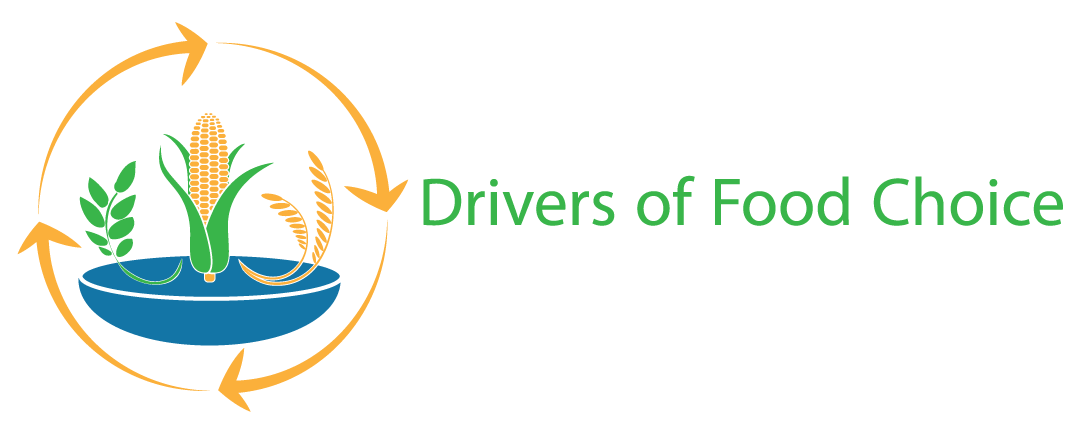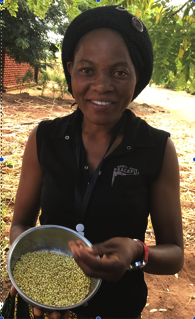 Dr. Helen Walls, London School of Hygiene and Tropical Medicine, describes her experiences as a Principle Investigator from data collector training in Zomba and the first round of data collection in Phalombe District, Malawi.
Dr. Helen Walls, London School of Hygiene and Tropical Medicine, describes her experiences as a Principle Investigator from data collector training in Zomba and the first round of data collection in Phalombe District, Malawi.
By Helen Walls, PhD – Principal Investigator
Dr. Helen Walls (London School of Hygiene and Tropical Medicine) is currently leading a research project in Malawi, titled: Do agricultural input subsidies on staples reduce dietary diversity”. The aim of this work is to examine the impact of Malawi’s agricultural input subsidy program, the Farm Input Subsidy Program (FISP), on overall food choices, by examining not just price and consumption of maize but crucially the effects of FISP on consumption of other foods. It will also explore the wider context of FISP policy implementation, food preferences and trade-offs.
Our first round of fieldwork in Malawi began in May 2017. My colleague Dr. Deborah Johnston (School of Oriental & African Studies, London) and I arrived in Zomba on a Saturday, and the following morning met with our local collaborators, Professor Ephraim Chirwa and Dr. Jacob Mazalale, from the University of Malawi’s Department of Economics, to review plans for the three weeks ahead. That afternoon, we met with our team of twelve data collectors, and started the training.
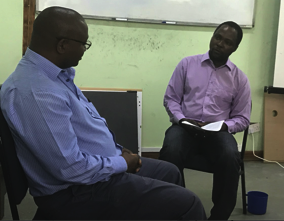
participating in a mock interview.
The training began with an overview of the project, and a discussion of research ethics and the importance of recording results accurately. Over the following days we went through each of the survey instruments and the questions to familiarize the data collectors with these. We also had to translate the questionnaires into Chichewa, which we did as we went along. The process took some time but was valuable given that it led to considerable discussion of concepts and language, and resulted in us as a group adapting some of the questions.
The translation and the interview practice that followed this – data collectors practiced in pairs and also did mock interviews in front of the group – was fun, and also gave us a good opportunity to get to know the data collectors better. Professor Chirwa’s sense of humour was particularly valuable here! Indeed, it was especially helpful to be working with local collaborators through the whole training process – in addition to bringing strong subject matter knowledge and vast experience with data collection, they also brought invaluable language skills and were skilled with the technical aspect of the language translation. During this training period we also piloted the questionnaires in a rural area near Zomba.
Then we went into the field. The group of data collectors was split between two areas – one team went to a rural area of Lilongwe District; the other to a rural area of Phalombe District. I joined the teamin Phalombe District, led by field supervisor Gift Masala, and Jacob joined the team in Lilongwe District, led by field supervisor Bridget Masanche.
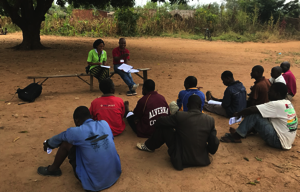
in a village of Phalombe District.
On arrival in Phalombe District, we had to get approval from the traditional authority (traditional heads of the area), and also from village chiefs. This required introductions, explaining why we were there, and asking permission to stay. Following this, we were ready to get underway. We decided to stay in a town in Phalombe District called Migowi, and found a local guesthouse. From here, each day we would venture to nearby rural areas to visit households to survey and to conduct focus group interviews.
The start of each day involved driving each data collector to their starting point and our field supervisor, Gift, showing each data collector the direction in which they had to walk to find households to interview. After the data collectors were organised for the day, Gift, our driver Lyson Mulamba and I would head off to undertake some task such as interviewing people at the District Council or visiting local markets to collect local food prices. Gift also led focus group interviews, with our colleague Doris Donda. At the end of the day we would collect the data collectors, and return to Migowi, where Gift would check that the data collectors had recorded study participant responses appropriately.
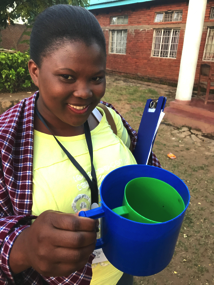
sizes of “our cup.”
With asking people in the field about quantity of foods eaten we needed a unit of measurement that would be consistent – we couldn’t just ask people about kilos, ‘piles’, etc. as a pile or even a kilo might be a different concept for different people. To solve this issue, Professor Chirwa decided that we would have our own group unit of measurement called “our cup” (to distinguish it from any old cup). Each data collector took with them two of these cups, and when they asked people about quantity they would ask the person to estimate how much would fit in the big or small version of our cup.
I enjoyed being in the field, experiencing the data collection process and meeting some of the people interviewed. Of course, this gives a very different perspective to the data that we are subsequently analyzing. Being in the field also had its fun and challenging moments. We started each day very early – receiving a bucket of warm water to wash before 5:30am as our guesthouse was without running water, and heading off to the field at 6:00am. These early starts were a bit of a shock to the system! I also experienced a lot of funny moments as a foreigner – as did those around me! For example, I was unable to do some ‘simple’ local things like eating sugar cane – which provided much amusement for anyone who witnessed my endeavours. Local children were always very interested in what we were doing, and we sometimes played games like soccer or ‘piggy in the middle’ with an empty bottle of water. Overall, it was a wonderful experience with beautiful scenery, warm weather, and great colleagues.

In terms of academic outputs, we have written one conceptual paper related to this work, which is currently under review with a journal, and we are working on several other papers. We are also preparing for the second round of fieldwork, which will take place in January 2018.
